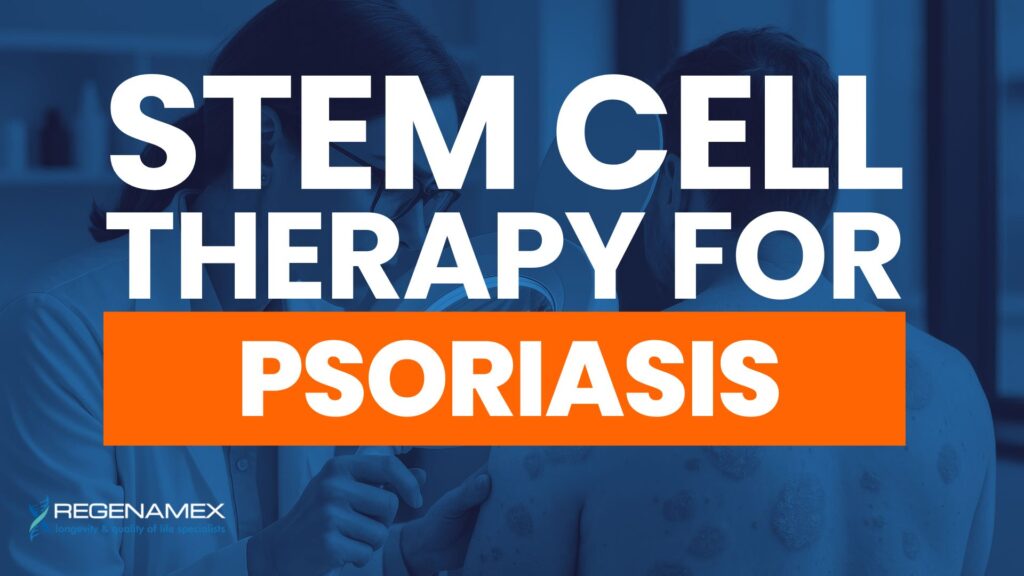
Stem Cell Therapy for Psoriasis: A Complete Guide to Regenerative Treatment at Regenamex
Psoriasis is a chronic autoimmune skin condition that affects millions of people worldwide, often causing cycles of painful inflammation, red patches, thick scaling, and emotional stress. For those who have tried creams, biologics, steroids, or phototherapy with limited success, stem cell therapy for psoriasis has emerged as a promising new option that goes far deeper than surface treatments. This regenerative approach targets the immune dysfunction behind psoriasis, aiming to rebalance the body at the cellular level—not just control flare-ups.
At Regenamex, a COFEPRIS-licensed regenerative medicine clinic in Mexico, mesenchymal stem cell (MSC) therapy is used to support immune regulation, reduce inflammation, and strengthen tissue repair. MSCs derived from Wharton’s jelly and placental tissue provide potent anti-inflammatory, immunomodulatory, and healing signals that directly address the root cause of psoriasis: abnormal immune activation and chronic systemic inflammation. In this comprehensive guide, we break down how regenerative medicine works for psoriasis, who benefits the most, scientific evidence behind it, cost comparisons, and what patients can expect throughout treatment.
Understanding Psoriasis and Why Regeneration Matters

Psoriasis is much more than a skin condition—it is an autoimmune disorder where the immune system mistakenly accelerates the turnover of skin cells. Instead of the typical 28-day cycle, psoriasis can shorten the process to 3–5 days, causing thick plaques, redness, and scaling. Triggers such as stress, infections, environmental toxins, and genetic factors increase inflammation throughout the body, affecting joints, nails, and even cardiovascular health. This is why many patients develop psoriatic arthritis, fatigue, and metabolic complications alongside their skin symptoms.
Traditional treatments like biologics, immunosuppressants, and topical steroids are designed to reduce immune overactivity, but they rarely address deeper dysfunction in immune signaling. Over time, many patients experience reduced effectiveness, side effects, or flare-ups when treatment stops. This is where regenerative autoimmune therapy becomes profoundly valuable. Stem cell therapy doesn’t just block symptoms—it influences the immune system’s communication pathways, reduces cytokine storms, and restores a healthier inflammatory balance. For many psoriasis patients, this shift leads to fewer flare-ups, improved skin integrity, and increased quality of life.
How Stem Cell Therapy for Psoriasis Works (Regenerative Mechanisms)
Stem cell therapy for psoriasis uses high-potency mesenchymal stem cells to modulate the immune system and repair damaged skin tissue. When MSCs are infused intravenously, they distribute throughout the bloodstream and migrate naturally to inflamed areas—especially the skin and immune centers such as the liver, spleen, and lymphatic system. Their first task is to calm immune hyperreactivity by releasing anti-inflammatory cytokines, balancing T-cell responses, and reducing the overproduction of inflammatory mediators such as TNF-α, IL-6, and IL-17, which are central drivers of psoriasis.
At the same time, MSCs secrete exosomes, growth factors, and micro-RNAs that promote tissue repair, improve microcirculation, and restore healthier skin regeneration cycles. This is why many patients experience changes not only in plaques but also in dryness, sensitivity, and overall skin texture. Regenamex exclusively uses Wharton’s jelly MSCs because they provide strong immunomodulatory properties, making them ideal for autoimmune conditions. By targeting inflammation at its origin, regenerative autoimmune therapy offers a deeper and more sustained improvement than most traditional topical treatments or pharmaceuticals.
Scientific Evidence Supporting Regenerative Autoimmune Therapy for Psoriasis
Emerging research supports the use of MSCs for autoimmune disorders, especially psoriasis. Clinical studies have shown that MSC therapy can reduce symptom severity, flatten plaques, and improve PASI (Psoriasis Area and Severity Index) scores. In several trials, patients with moderate to severe psoriasis experienced noticeable improvement within weeks of treatment and significant reduction in systemic inflammation over several months.
A study published in Stem Cells Translational Medicine found that intravenous MSC therapy reduced inflammatory markers and improved plaque healing in patients whose psoriasis was resistant to biologics. Another study reported improved immune regulation through increased T-regulatory cell activity, which plays a key role in preventing autoimmune flare-ups. Exosome-based therapy—often offered as an adjunct at Regenamex—has also shown promise in promoting faster skin regeneration and reducing scaling and redness. While more large-scale research is ongoing, current evidence suggests that MSC-based therapies offer a meaningful option, especially for patients who have not responded well to traditional treatment routes.
Who Is a Good Candidate for Stem Cell Therapy for Psoriasis?
Patients with moderate to severe psoriasis often benefit the most, particularly those who have experienced limited relief from biologics, methotrexate, steroids, or phototherapy. Individuals who suffer from psoriatic arthritis often see additional benefits, as MSCs not only target skin inflammation but also help reduce joint swelling, stiffness, and pain by modulating immune responses systemically.
Regenamex evaluates each patient through a detailed medical assessment that includes medical history, autoimmune markers, lifestyle factors, and potential comorbidities such as metabolic syndrome or thyroid imbalance. The best candidates typically are those who are non-smokers, manage environmental triggers, and are committed to lifestyle changes that support immune stability. Even patients with long-term psoriasis can achieve improvement, although the degree of regeneration varies depending on severity, systemic inflammation levels, and coexisting autoimmune conditions.
What to Expect at Regenamex: Treatment Process & Cost
Your journey begins with a comprehensive consultation, including a review of medical records, inflammation markers, and prior treatments. Once approved, Regenamex designs a customized regenerative autoimmune therapy plan that includes optimal MSC dosing, exosome support (if indicated), lifestyle guidelines, and monitoring schedules. All MSCs are processed in COFEPRIS-regulated, GMP-certified labs to ensure the highest levels of purity and potency.
On treatment day, MSCs are administered through a slow IV infusion designed to maximize systemic absorption. Patients typically experience no pain and can resume light activities afterward. Over the next several weeks, inflammation gradually decreases, and skin regeneration begins. Improvements often continue over six months as the immune system stabilizes.
Conclusion & Call to Action
If psoriasis has controlled your life for too long, regenerative medicine may offer the breakthrough you’ve been searching for. With stem cell therapy for psoriasis, Regenamex provides a scientifically grounded, ethically sourced, and highly personalized approach designed to reduce inflammation, restore skin health, and improve your quality of life. Our COFEPRIS-regulated team in Puerto Vallarta and Tijuana has helped patients worldwide regain comfort, confidence, and freedom from chronic flare-ups.
👉 Ready to explore a regenerative solution for psoriasis?
Visit Regenamex.com or contact our medical team today to receive your personalized evaluation and treatment plan. Your path to real healing begins here.
FAQs: Stem Cell Therapy for Psoriasis
Stem cell therapy for psoriasis is effective because it goes far deeper than surface-level treatments. Psoriasis is fundamentally an autoimmune condition in which the immune system mistakenly accelerates skin-cell turnover and triggers chronic inflammation. Mesenchymal stem cells (MSCs) intervene at the root of this malfunction by modulating overactive T-cells, calming inflammatory cytokines like TNF-α and IL-17, and restoring balance in the immune system. Instead of simply exfoliating plaques or suppressing symptoms temporarily, MSCs work to reset the cellular environment that drives flare-ups.
Improvements from stem cell therapy for psoriasis rarely happen overnight, but the changes build progressively and meaningfully. Many patients first notice a reduction in itching, burning, and redness within the first 4–6 weeks as inflammation begins to settle. This early response often signals that the immune system is starting to stabilize under the influence of MSCs.
Wharton’s jelly MSCs are considered one of the safest and most effective cell types for autoimmune disorders like psoriasis. Their natural immune-privileged properties allow them to interact with the patient’s immune system without triggering rejection or adverse immune responses. Because autoimmune conditions involve chronic inflammation and immune imbalance, the strong anti-inflammatory profile of Wharton’s jelly MSCs makes them particularly well-suited for treatment.
Patients with both psoriasis and psoriatic arthritis often experience a broader range of benefits from MSC therapy because the treatment does not target only the skin. Stem cell therapy for psoriasis influences systemic immune pathways, meaning it can reduce inflammation that affects the skin, the joints, and connective tissues simultaneously.
Most patients undergoing stem cell therapy for psoriasis respond well to a single high-dose MSC infusion due to the powerful immunomodulatory effect of Wharton’s jelly cells. This single treatment is often enough to calm overactive immune pathways and initiate tissue recovery.
The duration of improvement varies from patient to patient, but many experience long-lasting relief after stem cell therapy for psoriasis. Results often extend from one to three years, depending on lifestyle, inflammatory triggers, diet, stress levels, and overall immune health.

